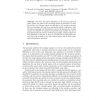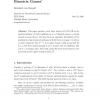1033 search results - page 9 / 207 » Stop the numbers game |
ICANN
2005
Springer
15 years 6 months ago
2005
Springer
Abstract. Some issues about the generalization of ANN training are investigated through experiments with several synthetic time series and real world time series. One commonly acce...
98
Voted
EOR
2007
15 years 29 days ago
2007
This paper uses dynamic programming to investigate when contestants should use lifelines or when they should just stop answering in the TV quiz show ‘Who wants to be a millionai...
105
Voted
CSL
2008
Springer
15 years 2 months ago
2008
Springer
We study the logical definablity of the winning regions of parity games. For games with a bounded number of priorities, it is wellknown that the winning regions are definable in th...
DCG
1999
15 years 21 days ago
1999
This paper presents a new lower bound of 2:414d= p d on the maximal number of Nash equilibria in d d bimatrix games, a central concept in game theory. The proof uses an equivalent ...
BMCBI
2007
15 years 1 months ago
2007
Background: The question of how a circle or line segment becomes covered when random arcs are marked off has arisen repeatedly in bioinformatics. The number of uncovered gaps is o...


